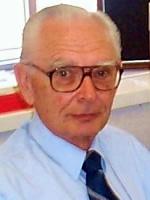Beginings of My Cooperation with Elliott Jacques in the Leadership Research Program for the US Army
- Another part of the work that we were doing, of course, was not just to predict, but rather to assess the current journal officers. We found that we could estimate the officer's potential by asking the officer to talk about the nature of his work. We also looked for cognitive skills that were different by level.
Speaker A I'm Owen Jacobs, and right now I am a retired executive director of the Institute of Complexity Management. It is a not for profit that we're trying to get started to do public service work ...
Transcript of the presentation video
NOTE: This transcript of the video was created by AI to enable Google's crawlers to search the video content. It may be expected to be only 96% accurate.
Speaker A I'm Owen Jacobs, and right now I am a retired executive director of the Institute of Complexity Management. It is a not for profit that we're trying to get started to do public service work and to get some of these ideas out into the general public media. I started my leadership work with Carl Lang in 1958 at the Presidio of Monterey with the organization that's called Human Resources Research Organization. Now we moved to Fort Benning in 1959 in order to be close to the Army's Center of Leadership Doctrine Development. And I guess I spent maybe another 17 or 18 years there, which was a very good time. We did a lot of basic research on leadership at unit level and then from there I went to the Army Research Institute. I think the primary thing of value there is the work that we did with Elliot Jacks and with Journal Officer Leadership to go back to the history that we were talking about just a bit. Elliot, I think, started work under contract to Ari. It must have been 1982 or thereabouts, working for folks at the London office, and then decided to move to the United States in order to be able better to do the work that he wound up doing with the Army Research Institute and the thing that we call the Executive Development Research Group. That was a very interesting thing that was put together by Neil Cosby. And I really am not dead sure that I know who the driver was, but I suspect it might have been General Thurman. It might also have been the then current. But at any rate, the mission that we were given was to find out what the core required competencies are of general officers. At that time, Elliot was a part of this group. He was under contract, and then there were several of us. In addition, Steve Clement was one of them, a mischief maker and a troublesome character, as he still is, with a wonderful set of ideas and energy and ability to help us do that work. Jillian Stamp had been collecting data using a technique called the CPA, the Career Progression Appreciation. And of course the key there is not that we were appreciating careers, but rather in England appreciation means evaluation and so it was a technique for evaluating an individual's potential for pursuing a career of thus and such as the individual might want to do. She had a longitudinal database that we asked her to analyze, which she did, and she wound up with a predictive correlation of something like 0.7, the individual's assessment at this point in time, the individual's predicted position in the organization up to 14 years later. And that correlation was between the predicted position and the actual 0.7 very powerful correlation which said that that was a very good technique for identifying potential. Another part of the work that we were doing, of course, was not just to predict, but rather to assess the current journal officers? Well, using an interview technique, we did not use the CPA, but what we found was that we could estimate the officer's potential by asking the officer to talk about the nature of his work. And among the four of us there was Elliot, Steve Clement, carlos Rigby and myself. In our early interviews we would each write down on a little slip of paper our estimate of that officer's ability or potential I should say. And then we compared those little slips of paper after the interview was finished and we were consistently in the same ballpark just about every time. So what that says is that that's a validation of step one of Elliot's notions about the complexity of the work itself and the complexity of the mental model the individual has developed about his work, its context and the system within which that work is embedded. So by and large, step one was we found Elliot's notions about discrete levels of work in a well structured organization seemed to be holding up at the one star, two star, three star and four star levels of army officers. We also used the interviews as the basis for understanding the nature of work at each of those levels. We tape recorded those interviews, transcribed them and content analyzed them. And that also was a validation of our impressions of discrete levels of work. We also in that, ah, content analysis work, looked for cognitive skills that were different by level.
Major organizations and consulting firms that provide Requisite Organization-based services





